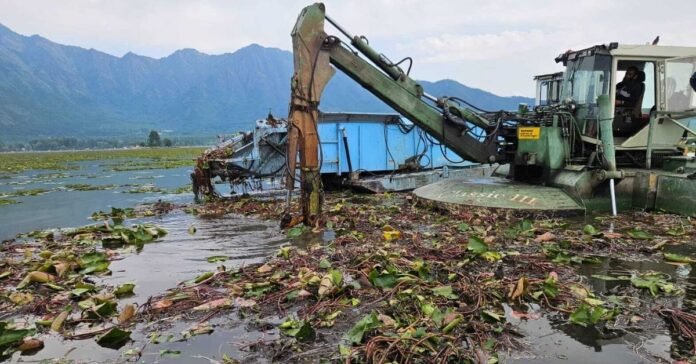
In 2013, Maninder Singh was just another tourist drifting across the mirror-like waters of Dal Lake with his wife, celebrating their first wedding anniversary. The shikaras swayed gently, the Himalayan peaks stood watchfully in the distance, and the whispers of willow trees rustled along the banks. It should’ve been a postcard-perfect moment.

But beneath that postcard surface was a sight that struck him harder than the chill in the Kashmiri air — mounds of tangled green weeds choking the lake’s serenity.
“Where do all these weeds even go?” he wondered aloud. “And why is no one doing anything about it?”
That question didn’t just haunt him — it redirected his life.
The Roots of a Green Dream

Maninder wasn’t new to bold ideas. Born in Meerut, Uttar Pradesh, he’d already pivoted from law student at ILS Law College, Pune, to tech entrepreneur, founding an IT-based education startup that turned profitable in under four years. But the pull of purpose was stronger than profit.
A trip abroad in 2012 had exposed him to another unpleasant reality — the world’s view of India’s sanitation woes. Maninder returned home not just with souvenirs, but with a mission: to build a social enterprise that tackled real, messy, everyday problems. Cleanliness, soil degradation, and unemployment topped his list.
And then came Dal Lake — the final nudge he needed to act.
Turning Weeds into Wealth
Those lake weeds weren’t just botanical eyesores; they were missed opportunities. Maninder took samples back to Delhi, tested them in top labs (from Gurugram to Sweden), and discovered something extraordinary — the weeds were rich in carbohydrates and could be transformed into high-quality organic manure.

By 2016, the CEF Group (CleanEffentech) was born — a social enterprise committed to tackling environmental degradation and waste management. And Dal Lake was its first battlefield.
In 2018, Maninder approached the Jammu & Kashmir government with his idea. It wasn’t easy. Four years of red tape, environmental impact assessments, community skepticism, and logistical hurdles later, he finally secured a 12-acre site near the lake.
Then came the machines. Then the magic.
From Marsh to Manure

The process is as intricate as it is elegant. Authorized vendors collect lake weeds from April to December (before the lake freezes), transporting them in trucks to the processing plant. There, the weeds are:
- Dried to reduce moisture,
- Shredded to fine particles,
- Composted in massive windrows for weeks,
- Enriched with bio-nutrients,
- Refined and packed into nutrient-rich, organic manure.
Each cycle — from soggy weed to farmer-ready fertilizer — takes about 40 days.
Reviving Soil and Spirits
But the impact? It’s both deep and wide.
Between August and December 2024 alone, the plant processed 14,864 tonnes of lake weed, converting 4,131 tonnes into manure and preventing 2,891 tonnes of CO₂ emissions. It’s math that makes the planet greener.

The manure, sold at Rs 12 per kg — cheaper than the Rs 16 farmers were paying for chemical fertilisers — has already benefited 2,500 farmers across 4,400 acres. Apple orchards in Shopian are blooming better. Soil health is rebounding. Yields are rising.
“Chemical fertilisers were ruining my land and draining my pocket,” says Sibir Hamdar, a farmer. “Now, with this organic option, my trees are thriving — and so is my hope.”
Jobs from the Lakebed Up
And it’s not just farmers reaping the rewards. The initiative has created over 1,500 jobs, from weed collectors to plant operators, including 24 full-time staff at the CEF Biofuel plant. Local youth, once job-hunting, are now lake-cleaning, manure-packing, and future-building.

Mohammed Adil, the site manager, beams with pride: “Every day we pull 140 tonnes of waste from the lake — and turn it into something valuable. We’re not just cleaning water; we’re reviving biodiversity, tourism, and livelihoods.”
Scaling the Ripples
The Dal Lake project is no longer just a local innovation. It’s a replicable model. Maninder is already scouting new waters — in Odisha and Rajasthan — to replicate the success. His long-term vision? To ensure no Indian lake is left choked by weeds or wasted potential.
“This isn’t just about cleaning up,” he says. “It’s about redefining how we look at waste — not as a problem, but as an opportunity.”
A Legacy in the Making

From a disturbed tourist to a determined changemaker, Maninder Singh’s journey is a masterclass in how a moment of discomfort can seed a movement.
Today, Dal Lake shimmers a little brighter. Its waters are a little clearer. Its surrounding communities stand a little stronger. All because one man saw weeds — and envisioned wonders.
Because sometimes, the most beautiful revolutions start beneath the surface.

